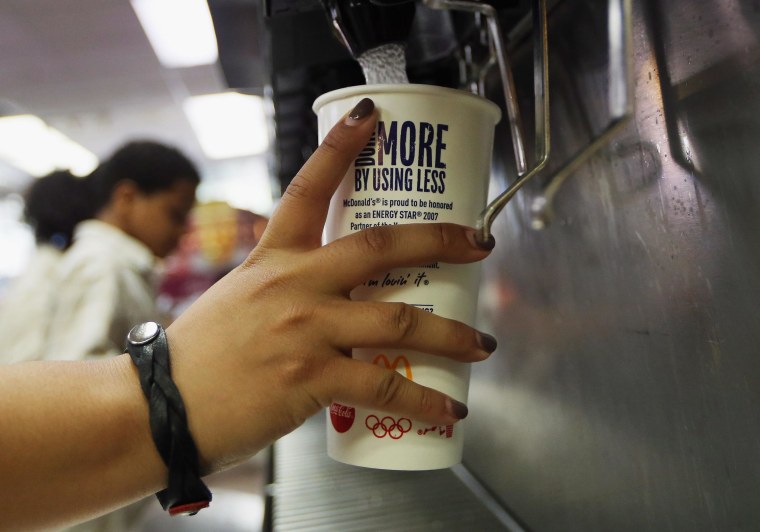Could soda be good for kids?
Philadelphia mayor Jim Kenney and other lawmakers say this could be the case if their new sugary-beverage tax, which would raise up to $400 million towards a universal pre-K program and other initiatives, is passed by the city council in June.
Plans to tax soda that emphasize health concerns usually get the fizz taken out of them — so some advocates have started to take an economic tact.
“Whenever something seems designed to take our freedoms away or restrict us … we get angry and push back,” said David Just, a professor of economics at Cornell University who works within the school’s food and brand lab.
Read More: Sugary Drinks May Kill 184,000 People Each Year, Says Study
The soft drink industry has capitalized on this, pouring millions of dollars into defeating proposed legislation across the country that would tax sugary beverages. In Philadelphia, two previous attempts by former mayor Michael Nutter failed.
Some public policy and nutrition experts think Philadelphia’s strategy this time, which emphasizes an economic rather than a health benefit, could be the key that unlocks public support for these taxes.
“That’s a very different message,” Just said. “I actually think it’s going to be much more persuasive, and this has a much better chance because of the way it’s framed.”
Proponents say that, even if the tax fails, a conversation will have been started about the role of soda and other sources of added sugar in our diets.
“We are, to a large extent, getting the message,” Just said.
According to the Beverage Marketing Corporation, consumption of bottled water, teas, energy and sports drinks have been rising, while both regular and diet soda consumption have been on the decline. Bottled water is the second-most popular beverage after carbonated soft drinks, and the company predicts water will grow to eclipse pop either this year or next.
Read More: Step Away from the Soda: Sugary Drinks Raise Cancer Risk for Women, Study Says
Backers of sugary-beverage taxes want Americans to pay more attention to added sugar in their diets — a quest that just got some help from the FDA’s new nutrition-labeling standards that will include the amount of added sugar on food packaging. But they’d still like a big-city win. So far, the only city to successfully tax sugary drinks is Berkeley, California, although it’s been attempted in other cities including San Francisco and Chicago.
Characterizing these taxes as revenue-generators for widely supported programs could be a game-changer, experts say.
“Places like Philadelphia are now the new frontier, in a way, where we may see more of this,” said Matthew Harding, an assistant professor of public policy at Duke University.
“I think to some extent people's reticence may change especially as the focus shifts away from this public health component … Perhaps an economic-based message may resonate more strongly,” he said.
Even in famously liberal Berkeley, the soda tax's success in 2014 wasn't entirely due to public health concerns. Changing the story’s Goliath from nanny-state bureaucrats to moneyed corporate interests altered the vote’s outcome, and tapped into a similar us-versus-them narrative.
“Framing is important,” Marion Nestle, a professor of nutrition, food studies and public health at New York University, said in an email. “Berkeley framed the tax measure as Berkeley Against Big Soda. That worked.”
Barry Popkin, a professor of nutrition at the University of North Carolina, said Philadelphia’s Mayor Kenney would benefit from eventually incorporating a stronger health message into his campaign as it hits the home stretch.
“I think he’s been smart, but now he also needs to bring in the health card a little bit,” Popkin said, because beverage industry opposition has begun to frame the initiative as a “grocery tax” that would hurt low-income and minority residents.
Read More: Can Soda Survive America's Anti-Pop Culture?
“They’re one of the highest soft drink consumers in the country,” Popkin said, pointing out that poor Americans, particularly minorities, have disproportionately high rates of obesity-related health issues like hypertension and diabetes. Now that opponents are presenting the tax as a blow to the poor, a health-related argument could help counter that claim, he said.
“The tax is going to have a really major health effect,” Popkin said. At three cents an ounce, it could drive prices above what Philadelphia’s poorest residents will pay.
“The poor don’t pay the soft drink tax — they stop drinking it. The rich pay the tax. The fact is that low-income people are much more price sensitive, especially if you have a big price increase,” he said.
